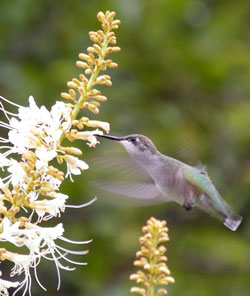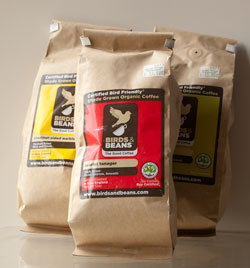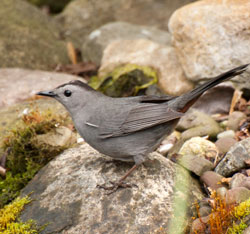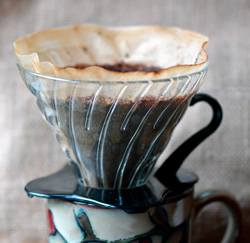Just coffee
 ©Janet Allen
©Janet Allen Hummingbirds also depend on winter habitat in shade coffee plantations
Why do we put coffee in a special category? Because of its out-size impact on people, birds and other creatures, and the planet.
Birds that we enjoy in the summer, such as the ruby-throated hummingbird and many others, need winter homes in Central America.
Unfortunately, since the 1970s, traditional shade coffee plantations have been converted to sun plantations, and that has virtually eliminated this important habitat for birds and other creatures. Sun plantations also require a lot of pesticides.
In the mid-elevations of Mexico, Central America, the Caribbean, and Colombia, most of the forests still standing are in traditional coffee plantations. These provide the last refuge for birds that have lost their habitat to the vast destruction of tropical forests.
Choosing shade-grown coffee can also help preserve the rainforest—an important carbon sink for the planet.
Buying shade-grown coffee helps birds
 ©Janet Allen
©Janet Allen Bird & Beans bird-friendly coffee
By purchasing coffee grown in the shade instead of the cheaper grocery store sun plantation coffee, we help keep shade coffee economically viable.
To be sure it is providing habitat for birds, we look for one of the following certifications:
Bird Friendly - certified by the Smithsonian Migratory Bird Institute
Eco-OK - certified by the Rainforest Alliance
Birds & Beans is one of the few brands that has the qualities we want. It's hard to find this, so we sometimes buy make a trip to the Wild Birds Unlimited store and buy multiple bags.
Mexican Organic and Peruvian Organic coffees are likely to be shade-grown, but are not certified as such.
Fair Trade and organic, too
 ©Janet Allen
©Janet Allen The catbird is one of our favorite birds, and it depends on a winter home in Central America
By buying shade-grown coffee that's also Fair Trade, we ensure that the farmer that raises the coffee—not middlemen—gets a fair portion of the profits. (Otherwise, they get a miniscule amount of even the pricey coffee sold here.)
And by buying organic coffee (even aside from avoiding pesticides ourselves) we help ensure that the land in Central America isn't contaminated.
We also try to buy organically grown, certified Fair Trade teas, though we haven't always done this. Once we find a brand that we always use, this will become easier.
Making coffee
 ©Janet Allen
©Janet Allen Our glass coffee maker
Just as we can prevent the dangerous chemical dioxin by choosing our paper carefully, we do the same by using unbleached coffee filters.
Then we realized that putting near-boiling water into plastic—done for all the coffeemakers we looked at—isn't very smart. However "food safe" they claim to be otherwise, heated plastic can't be healthy!
It took a while for us to adjust to the manual method of brewing coffee, but it's just a habit now. Certainly it's just as good coffee.
We then deposit our coffee grounds in our worm bins (though they'd also be great in our regular compost bin.)
